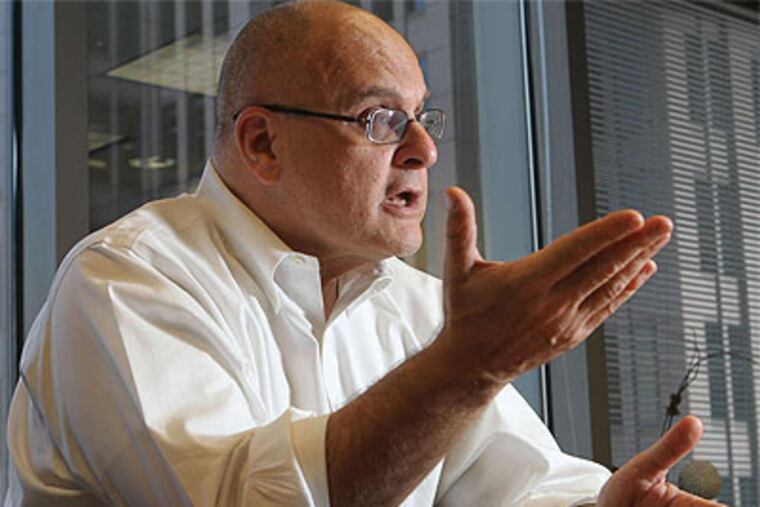William Penn head abruptly leaves post
Jeremy Nowak, president of the William Penn Foundation for only 18 months, has left his position, the foundation announced Wednesday, catching the region's nonprofit and educational communities by surprise.

Jeremy Nowak, president of the William Penn Foundation for only 18 months, has left his position, the foundation announced Wednesday, catching the region's nonprofit and educational communities by surprise.
Foundation officials said in a statement that "differences in approach regarding implementation" of William Penn's new strategic plan - developed during the aggressive Nowak's tenure - led to the departure.
There was no hint it was coming - even foundation staff members were caught off guard. Nowak apparently left the office for good Tuesday evening.
"Jeremy Nowak guided the William Penn Foundation to understand the challenges the region will face in the coming years and to help position the foundation to focus its resources to meet those challenges," board chairman David Haas said in a statement. "He will remain an important resource and adviser as the foundation moves forward in implementing its strategic plan."
Gary Steuer, the city's chief cultural officer, said, "I'm as shocked as anyone by this. William Penn is a critically important player in the city's cultural landscape."
William Penn's philanthropic role has escalated in the last decade as the Annenberg Foundation, once a regional bulwark, relocated to Los Angeles and the Pew Charitable Trusts, at one time wholly based in Philadelphia, moved much of its activity to Washington, D.C.
That has left William Penn - its $2 billion in assets leavened by the 2009 gift of $750 million from John C. Haas, who died in 2011. (The foundation was started by Otto Haas, a founder of the Rohm and Haas chemical manufacturing company, and his wife, Phoebe, in 1945.)
Sources say Nowak arrived in the summer of 2011 with a mandate from the foundation's board to address its emerging mega-role in the region and to craft a new focus with a sweeping strategic plan.
Previously, he was founding chief executive of the Reinvestment Fund, a well-known organization focused on urban development through housing, community arts centers, schools, commercial real estate, and sustainable energy projects.
"Jeremy was brought in as a change agent," said Tom Kaiden, president of the Greater Philadelphia Cultural Alliance. "Change is an important part of the strategic plan."
Nowak also made a number of personnel changes, prompting some longtime foundation staffers to leave as new program officers came aboard.
As speculation about his exit rippled from phone to e-mail to text around the region, one theme stood out: Nowak may have moved at a pace and in a direction that produced far too much friction at William Penn.
"Jeremy was making a lot of change very fast," said a close observer, who emphasized the speculative nature of his comments. "William Penn is still a family foundation and family foundations tend to move slowly. . . . He moved too quickly and too aggressively and lost the support of the board."
The changes in staff and strategic direction led to anxiety among grantees in the region, officials from all program areas said. And the substance of his vision - embrace of the private sector and lionization of "economic development" - made Nowak himself an issue.
"He doesn't know enough about philanthropy and what its uses are and aren't," said one observer.
Nevertheless, the strategic plan has been completed and is scheduled for implementation starting in January. Henceforth, it says, the foundation will focus on the achievement gap plaguing low-income students by "increasing the supply" of schools; on investment in public spaces to enhance Philadelphia as a "creative community;" and on ensuring clean water by protecting regional watersheds.
In addition, the foundation will build two investment vehicles, a Transformation Fund and an Innovation Fund, to boost "breakthrough ideas" and "help key legacy organizations respond to changing conditions." In the past, it has focused on the same areas but in a far less formal fashion.
In the cultural community, Nowak and foundation officials have said, some kinds of organizations will simply no longer be eligible for grants.
Nancy Burd, head of the Burd Group consulting organization, sat in on public plan presentations and said the new plan seemed "to lock out a lot of sectors they've funded in the past." That, she added, "was not well received by the community. . . . There seemed a clear message that the history community would be eliminated."
The foundation's changing direction with schools has already caused controversy. It funded a multimillion-dollar "blueprint" for restructuring the Philadelphia School District, largely through privatization. Introduced earlier this year, the plan caused an uproar.
In a phone interview Wednesday, Haas said Nowak's departure was unrelated to the school project: "This change in leadership has no bearing in our work with the schools."
He also emphasized that the board remained committed to the strategic plan - "committed to its work in the Philadelphia region, and that remains unchanged."
A search committee will identify candidates for Nowak's position, and William Penn veteran Helen Davis Picher has been named interim president. She most recently served as the foundation's director of evaluation and planning.
Nowak, who could not be reached directly, said in a statement: "I am extraordinarily proud of the work we have done that will guide the William Penn Foundation for years to come. I am confident the foundation is well-positioned to positively impact the region - particularly with so many facing such economic uncertainty. I look forward to continuing to support the foundation to address the critical needs of the Greater Philadelphia region."
Foundation officials said new program guidelines and application procedures will be issued in late January.
"What's important is that [the foundation has] reaffirmed its commitment to Philadelphia, and reaffirmed its commitment to culture, children, and the environment" said the Cultural Alliance's Kaiden.
"What's the family history? What's their legacy? It's a strong commitment to Philadelphia."